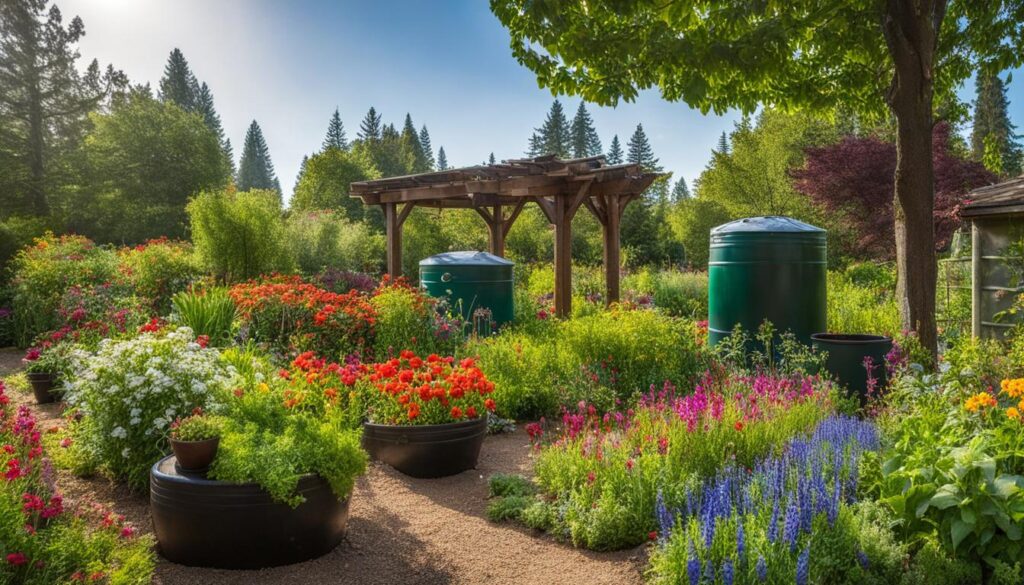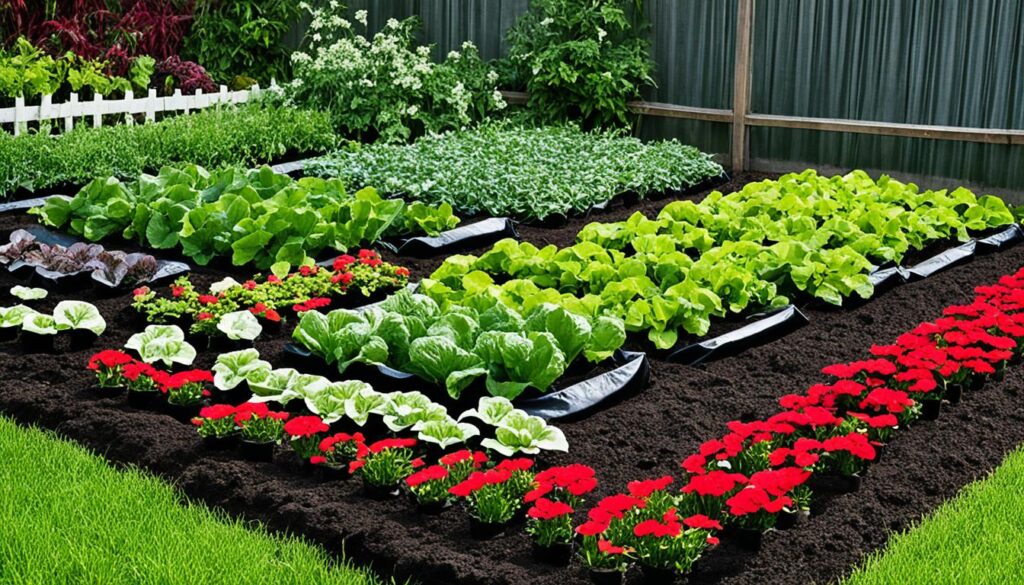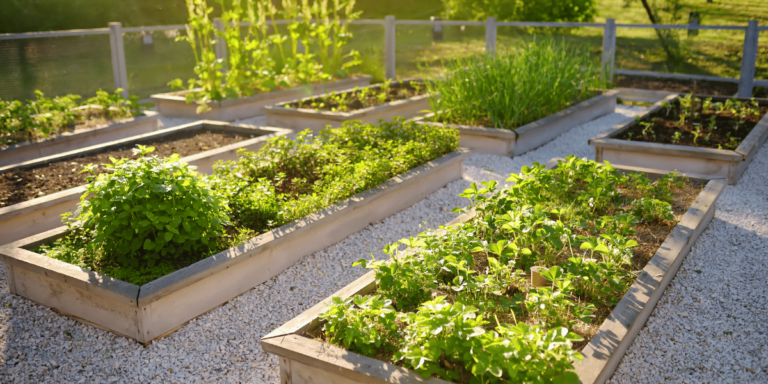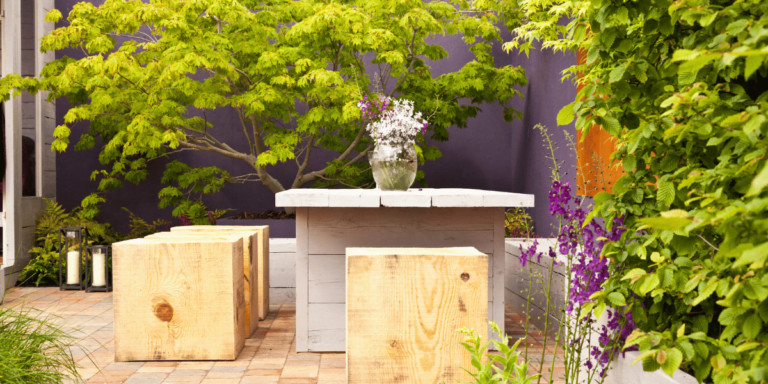Organic garden care is a holistic approach to cultivating healthy plants using natural techniques and sustainable gardening practices. By embracing eco-friendly practices, you can create a thriving garden ecosystem that benefits both your plants and the environment.
With organic garden care, you can say goodbye to harmful synthetic pesticides and fertilizers, and instead, focus on nurturing your plants with organic matter, compost, and natural pest control methods. By working with nature rather than against it, you can promote the health and vitality of your plants while minimizing negative impacts on the environment.
Key Takeaways:
- Organic garden care involves using natural techniques and eco-friendly practices.
- Sustainable gardening methods create a thriving garden ecosystem.
- Embracing organic garden care promotes healthy plants and reduces environmental impact.
- Focus on nurturing plants with organic matter, compost, and natural pest control methods.
- Work with nature to promote plant health and minimize synthetic chemicals.
Weed Control: Maintaining a Healthy Garden
Weeds can be a persistent nuisance in any garden, competing with your plants for resources and hindering their growth. To keep your garden free from these unwanted invaders, implementing organic weed control methods is essential. By using natural techniques, you can effectively manage weeds without resorting to harmful chemicals.
Hand Weeding
Hand weeding is one of the oldest and most reliable methods of weed control. Simply pull the weeds out by hand, making sure to remove their roots as well. This method is especially effective for removing small patches of weeds or individual plants.
Water Management
Proper water management is key to weed control. Most weeds thrive in moist soil, so it’s important to water your garden plants carefully and avoid overwatering. By giving your plants just the right amount of water they need, you can create an environment that discourages weed growth.
Mulching
Using organic mulch like straw, wood chips, or leaves can significantly reduce weed growth in your garden. Mulch acts as a protective barrier, preventing weed seeds from germinating and blocking sunlight that weeds need to grow. It also helps to retain soil moisture and regulate temperature.
Use of Barriers
Physical barriers like landscape fabric or cardboard can be used to smother weeds and prevent them from sprouting. These barriers are usually laid on the ground before planting, creating a barrier between the soil and the weed seeds. This method works best for larger areas or when starting a new garden bed.
Competitive Planting
Planting densely is an effective way to outcompete weeds for resources. By filling your garden with a variety of plants that are well-suited to your local climate and soil conditions, you create a dense planting scheme that leaves little room for weeds to establish.
Flaming
Flaming involves using a propane torch to quickly heat and kill young weeds. This technique is most effective for killing weeds in the early stages of growth and works well for larger garden areas. Take care when using this method to avoid damaging desirable plants.
Corn Gluten Meal
Corn gluten meal is a natural herbicide that can be used to inhibit weed seed germination. It is safe to use around established plants, but it should be applied before weed seeds have a chance to sprout. Follow the instructions on the package for best results.
Natural Herbicides
There are a variety of natural herbicides available on the market that can help control weeds in your garden. These products are typically made from plant-based ingredients and are safer for the environment compared to synthetic herbicides. Be sure to follow the instructions on the label when using natural herbicides.
Implementing these organic weed control methods will help you maintain a healthy garden that is free from unwanted plants. By managing weeds naturally, you can ensure the well-being of your garden and promote the growth of your desired plants.
Waterwise Gardening: Efficient Water Usage in the Garden
Water is a precious resource, and efficient water usage in the garden is crucial for sustainable gardening practices. By practicing waterwise gardening, you can conserve water while still maintaining a healthy and thriving garden.
Designing based on average annual rainfall
One strategy for waterwise gardening is to design your garden based on the average annual rainfall in your area. This involves selecting plants that are native or well-adapted to your region’s climate and rainfall patterns. These plants are more resilient and require less water to thrive.
Using rain barrels for water collection
Another effective technique is to install rain barrels to collect and store rainwater for later use in the garden. This not only reduces water usage from the mains supply but also provides plants with natural, untreated water that they prefer. Place the rain barrels strategically to catch runoff from gutters or downspouts.
Improving water retention with organic matter
Adding organic matter, such as compost or well-rotted manure, to your garden soil can significantly improve its ability to retain water. Organic matter acts as a sponge, holding moisture and releasing it slowly to plant roots. This helps reduce the frequency of watering and prevents water runoff.
Reducing evaporation and weed growth with mulch
Using mulch around your plants can help reduce water evaporation from the soil surface and inhibit weed growth. Apply a layer of organic mulch, such as wood chips or straw, to conserve soil moisture and prevent weed competition.
Watering less frequently but deeply
Instead of shallow, frequent watering, aim to water your garden less often but deeply. This encourages plants to develop deep root systems that are more efficient at extracting water from the soil. Water slowly and deeply to ensure the water reaches the plant’s root zone.
Grouping plants according to water needs
Grouping plants with similar water requirements together in your garden can prevent overwatering or underwatering. This allows you to target watering more effectively, giving only the necessary amount of water to each group depending on their specific needs. Consider the sunlight exposure, soil type, and water requirements of different plants when planning your garden layout.
Using efficient drip irrigation
Utilizing drip irrigation systems can significantly reduce water waste compared to conventional sprinkler systems. Drip irrigation delivers water directly to the plant’s root zone, minimizing evaporation and ensuring efficient water usage. By placing emitters near the base of each plant, you can provide water precisely where it’s needed without overspray or runoff.
Implementing water-saving tips
Here are some additional water-saving tips for your garden:
- Water early in the morning or late in the evening to minimize evaporation.
- Avoid watering on windy days to prevent water loss through drift.
- Regularly check for leaks in your irrigation system and fix them promptly.
- Adjust the watering schedule according to seasonal changes and plant growth.
- Collect and repurpose household water, such as used cooking water or water from fish tanks, for watering plants.
Educate yourself on local water restrictions and guidelines to ensure compliance and responsible water usage.
By incorporating these waterwise gardening techniques and implementing efficient irrigation methods, you can create a beautiful garden while conserving water and contributing to a more sustainable future.
Plant Protection: Extending the Growing Season
Plant protection is a crucial aspect of organic gardening, particularly when it comes to extending the growing season and safeguarding plants against frost and cold weather. By employing various season extenders, you can provide additional warmth and insulation to your plants, allowing them to thrive even in unfavorable conditions.
Cold Frames and Hot Beds
Cold frames and hot beds are popular season extenders that offer protection against low temperatures. Cold frames are made of transparent materials like glass or polycarbonate and act as mini greenhouses. They capture sunlight and trap heat, creating a warm and sheltered environment for plants. Hot beds, on the other hand, incorporate a heating element, such as compost or manure, to generate heat and maintain a consistent temperature.
Wall O’ Waters
Wall O’ Waters are individual plant protectors made of water-filled tubes. These protective cylinders absorb heat during the day and release it at night, creating a microclimate that shields tender plants from frost damage. They are particularly effective for heat-loving plants such as tomatoes, peppers, and eggplants.
Floating Row Covers
Floating row covers consist of lightweight fabric that is draped over plants to protect them from cold temperatures while still allowing sunlight, air, and moisture to penetrate. These covers can be easily suspended using hoops or stakes, forming a protective barrier that shields plants from harsh weather conditions.
Cloches
Cloches are individual protective covers, commonly made of glass or plastic, that are placed over individual plants or seedlings. They act as mini-greenhouses, trapping heat and protecting plants from cold, wind, and pests. Cloches are especially useful for early-season or delicate crops.
Greenhouses
Greenhouses offer a comprehensive solution for year-round gardening, providing an optimal environment with controlled temperature, humidity, and sunlight. They come in various sizes and designs, ranging from small backyard structures to large commercial operations, and are equipped with ventilation systems, heating, and automated watering systems to ensure optimal plant growth.
By utilizing these plant protection methods, organic gardeners can effectively extend their growing season, protect their plants, and prolong the harvest. These season extenders offer a range of options to suit different garden sizes and climates, enabling gardeners to enjoy fresh produce for an extended period.
Conclusion: Embracing Organic Garden Care for a Sustainable Oasis
Organic garden care is the key to creating a lush and sustainable oasis in your own backyard. By adopting sustainable gardening practices and using natural techniques, you can ensure the health and vitality of your plants while minimizing negative impacts on the environment.
Implementing strategies for weed control, waterwise gardening, and plant protection is essential for maintaining a thriving garden ecosystem. Organic weed control methods such as hand weeding, mulching, and competitive planting can keep unwanted plants at bay, while efficient irrigation techniques like drip irrigation and waterwise gardening tips help conserve water.
To extend the growing season and protect your plants, consider using season extenders like cold frames, floating row covers, or greenhouses. These structures provide additional warmth and insulation, allowing you to enjoy the beauty of your garden for longer.
Embrace organic garden care and let your garden flourish. With sustainable gardening practices, eco-friendly techniques, and a focus on the health of your plants, you’ll not only create a thriving garden ecosystem but also contribute to a greener and more sustainable world.
Frequently Asked Questions
What is organic garden care?
Organic garden care involves using natural techniques and eco-friendly practices to promote the health and vitality of plants.
How can I control weeds in my garden organically?
Some effective techniques for organic weed control include hand weeding, water management, mulching, the use of barriers, competitive planting, flaming, corn gluten meal, and natural herbicides.
What are some strategies for waterwise gardening?
Strategies for waterwise gardening include designing a garden based on average annual rainfall, using rain barrels for water collection, adding organic matter to improve water retention, using mulch to reduce evaporation and weed growth, watering less frequently but deeply, and grouping plants according to their water needs.
How can I protect my plants from frost or cold weather?
Season extenders such as cold frames, hot beds, wall o’ waters, floating row covers, and cloches provide additional warmth and insulation to protect plants from the elements.
Why should I embrace organic garden care?
Organic garden care allows you to create a thriving garden ecosystem while minimizing negative impacts on the environment. It promotes sustainable gardening practices and the health and vitality of your plants.













